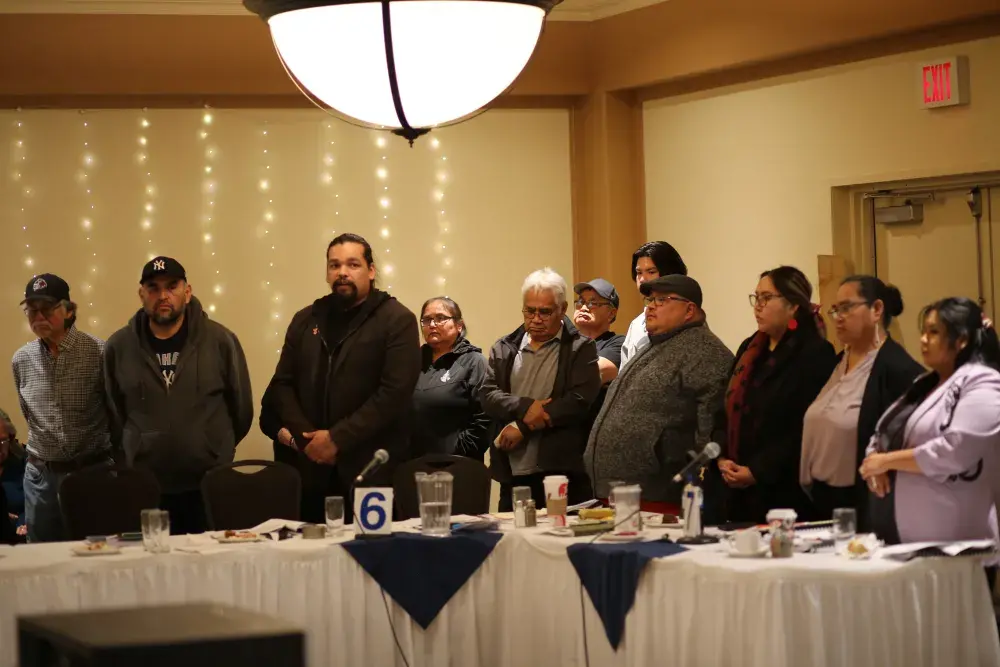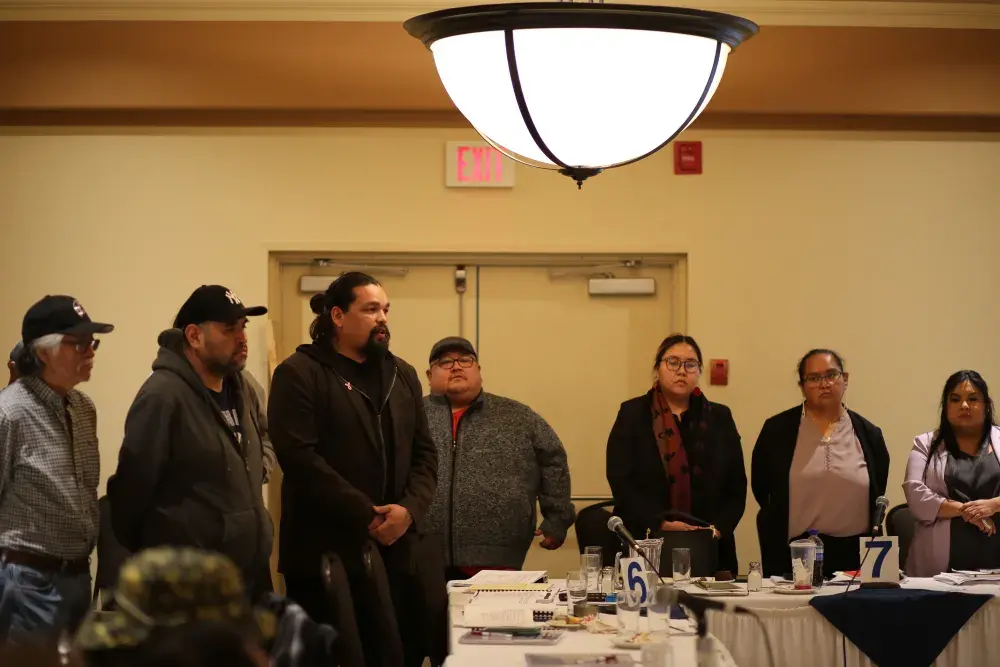The 2023 Nuu-chah-nulth Tribal Council Annual General Meeting ended with an announcement from Ahousaht chief and council, stating that they plan to disengage from NTC’s health-specific programs so that the First Nation can directly manage these services on their own.
Elected Chief n̓aasʔałuk (John Rampanen) thanked the other Nuu-chah-nulth nations for standing together over the years and helping Ahousaht get on their feet. He said the nation will begin to transition into a new model of health delivery services in 2024.
“Ahousaht leadership is also currently engaged in pathways to reclaim jurisdiction over Health, Justice, Child & Family Services as well as Education. Jurisdiction in these respective areas will provide Ahousaht with greater autonomy over all aspects of these respective areas,” he told Ha-Shilth-Sa.
The move, he said, would allow Ahousaht more authority and access to the health services its people need. In addition, it would save administration costs at the NTC level.
“It is estimated that the administrative fees gleaned off the top of health funds intended for Ahousaht total eight per cent for FNHA [First Nations Health Authority] and 12 per cent for NTC. This means that an estimated 20 per cent of health funds allocated specifically for Ahousaht is not reaching our Nation,” Rampanen wrote in an email to Ha-Shilth-Sa.
Direct funding to Ahousaht, he noted, will bypass the 12 per cent NTC administrative costs and also provide Ahousaht direct communication with FNHA, provincial and federal agencies to access health care services.
Ahousaht is the largest Nuu-chah-nulth First Nation with a list of more than 2,200 registered members, with slightly less than 40 per cent living in its main village on Flores Island, and a growth rate at 2.6 per cent annually.
Located on remote Flores Island, about a 40-minute water taxi trip from Tofino, travel in and out of the community can be difficult and expensive. Residents access most health services in Tofino, Port Alberni and beyond.
The village has two wellness centres, and a medical centre is in the works.
“Ahousaht people know what Ahousaht needs,” said Rampanen.
And he assured that those living off reserve would not be forgotten.
“This will enhance and strengthen our nation – all Ahousahts matter, no matter where they live,” he added.
According to Rampanen, Ahousaht has been entertaining the idea of disengaging from NTC health services for several years. Doing so would allow Ahousaht to develop a direct funding arrangement with the First Nations Health Authority, providing “greater self-determining control over health funds intended specifically for our nation as well as more flexibility and authority over how health funds are allocated and used by Ahousaht,” he wrote in an email to Ha-Shilth-Sa.
Currently, Ahousaht shares health services at the NTC level with other Nuu-chah-nulth nations and resources are spread thin, according to a statement from the First Nation’s chief and council. While Ahousaht works to build services into Ahousaht, they are also thinking of their neighbors with smaller populations.
Rampanen says a planned medical centre to be built in Ahousaht would not only meet the needs of residents, but could potentially be accessed by neighbors to the north, like Hesquiaht, cutting their travel time and expenses.
“We would not want to see smaller nations negatively impacted by Ahousaht,” he said.
Ahousaht is in negotiations for the opening of a medical centre/nursing station. To have this service would significantly reduce medical travel expenditures.
Ahousaht is developing a network of health care services that includes counselling and other wellness programs already offered at their holistic center called Chachum Hii Yup Tiicmis. The recently acquired Tofino Wilderness Lodge will be used in the off-season as a healing and well-being centre. Revenue generated at the lodge during the eight-month tourist season could be reinvested back into healing and well-being programs.
Rampanen says Ahousaht members will likely not see any significant changes in their access to health care over the next few months, because the change will be introduced gradually. Plans are in the works for enhanced elder care supports both on and off reserve.
“We heard that loud and clear, that more elder support is needed,” said Rampanen, adding that he doesn’t know what that support will look like, yet.
Ahousaht assures membership that disengagement from the NTC program will not disrupt any current health services for Ahousaht.
“We anticipate that the quality and level of direct service to and for Ahousaht people will only be enhanced and strengthened,” said Rampanen.
Ahousaht leadership is developing a plan and acknowledge that some health services from the NTC may need to be retained until Ahousaht is in a position to fill those roles from within.
The disengagement from NTC Health Services is set to begin April 1, 2024, however, this will be an ongoing process. Rampanen says that work will continue as the First Nation’s leadership identifies, develops, and implements Ahousaht-specific health services.
Ahousaht leadership will engage with membership to gather input as they further develop their health care plan.
“At the end of January 2024, there will be a series of at-home and urban reconciliation engagement sessions hosted,” said Rampanen. “This will kick-off an ongoing series of community-oriented dialogues to update and hear from Ahousaht employees and community members.”
Ahousaht Leadership has also brought on board a health strategist, Margaret Dick, to support with this initiative.
Rampanen says Ahousaht has put a lot of consideration into this decision and Ahousaht leadership wish to thank member Nuu-chah-nulth nations for helping Ahousaht “get on their feet”.
“This is a testament to the leadership, and we would like to express our gratitude to them,” he said.


